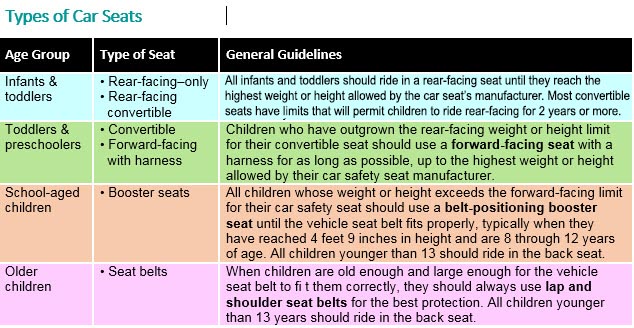Safe RV road trips begin by buckling seat belts, using car seats
Traveling across the country in a recreational vehicle (RV) can be exciting for kids of all ages. To keep everyone safe in your home on wheels, be sure to use seat belts and car seats.
When buying or renting an RV, families should look for safe seating arrangements for everyone, said Benjamin D. Hoffman, M.D., FAAP, a pediatric transportation safety expert and American Academy of Pediatrics (AAP) member.
"That's certainly the best, that you have a forward-facing seating position with a seat belt available for any passenger, whether they're going to be riding in a car seat, booster seat or just in a seat belt," he said.
Families can use AAP car seat guidance when selecting a seat for their child. See Car Seats: Information for Families for more information.
The following is additional safety advice for RV travel:
Do not sit on side- or rear-facing benches when the RV is moving. "Car seats and booster seats are only approved for use in a forward-facing vehicle seat using either a seat belt to attach it or the lower anchor attachment," Dr. Hoffman said.
Choose an RV that meets Federal Motor Vehicle Safety Standard 208. These RVs have type 2 (lap and shoulder) belts in all forward-facing seating positions. Type 1 belts (lap only) are not safe for children.
Tow the RV or drive a second car. If there aren't enough safe seating positions for everyone, bring a second vehicle or rent a tow-behind style RV.
Don't distract the driver. Drivers must focus on the road. RVs have a longer stopping distance, maneuver differently and take longer to avoid road hazards.
Remember the laws of physics. "It's a house on wheels, and there's a ton of stuff," Dr. Hoffman said. "If a vehicle is moving 60 mph, everything inside the vehicle is moving 60 mph, including the passengers, the blender and everything else. If you're unrestrained at any point, you're a potential human missile." RVs also are prone to rolling over, the most dangerous type of crash, Dr. Hoffman said.
"Parents should strive to be just as safe with their kids in the RV and do exactly what they would do in their passenger vehicle in that RV."

Additional Information & Resources: